My 25% Rule to Help You Grow Consciously
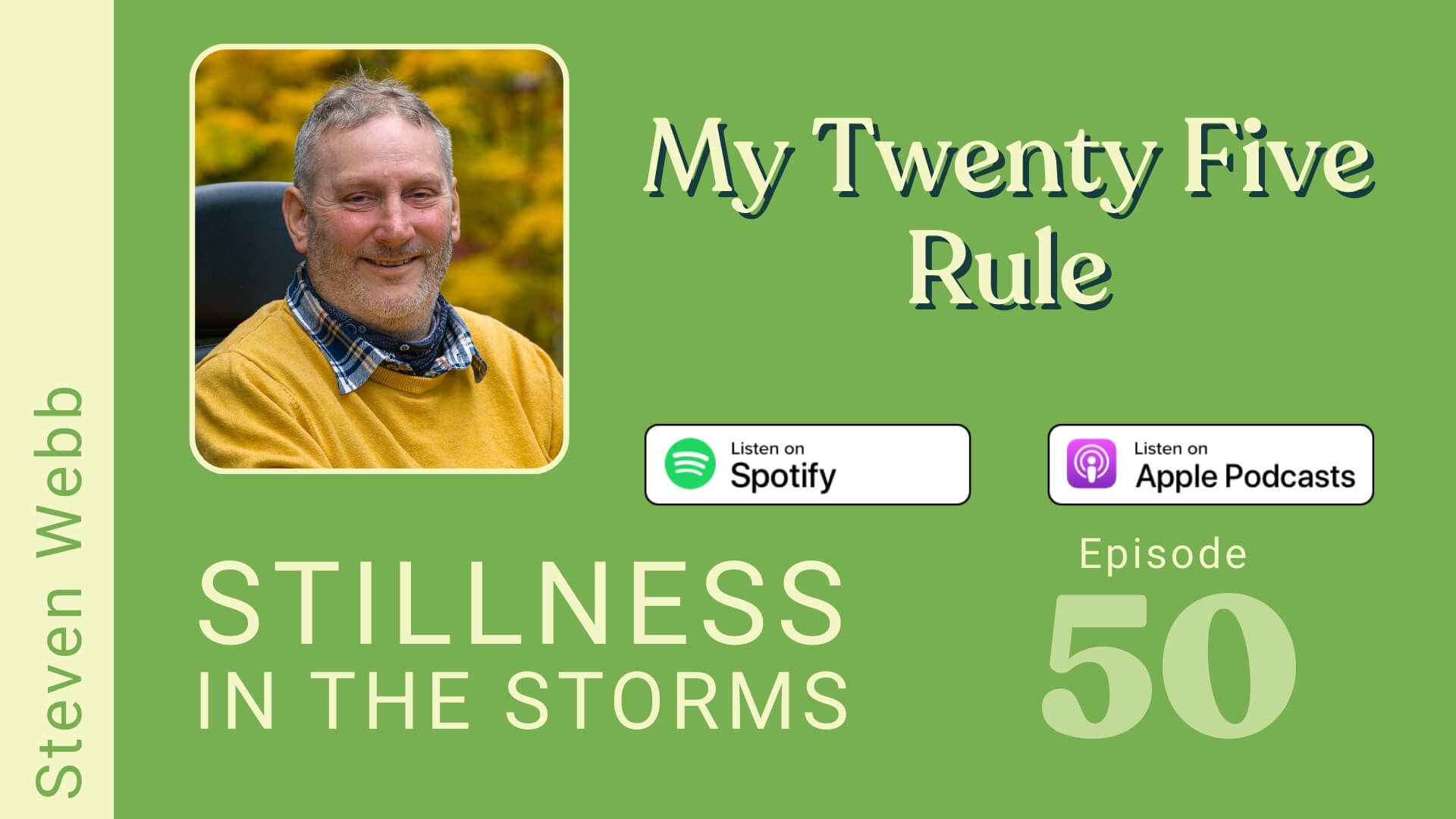
We all want to get out of my comfort zone, but we fear the risk it involves. What if there’s a way we can grow consciously, grow our awareness by stepping out of my comfort zone but without too much of a risk?
Reasons it’s Awesome to be Paralysed (DON’T LISTEN IF EASILY OFFENDED)
Links to Steven Webb’s podcast and how you can support his work.
- Donate paypal.me/stevenwebb or Coffee stevenwebb.uk
- Steven’s courses, podcasts and links: stevenwebb.uk
We’re diving into some pretty cool stuff today about the seven awesome things about being paralyzed. I’m sharing how I like to reframe challenges in life, taking inspiration from Stoic philosophy. Life throws us curveballs, but it’s all about finding the gifts hidden within those challenges. I believe it’s super important to change our perspective on tough situations, and I’ll explain why. Plus, I’ll share my experiences and insights, hoping to help everyone see things a little differently and find that inner calm. So, let’s jump right in and explore these seven things together!
Yes, you read the title right! You can also watch this on my YouTube https://stevenwebb.com/youtube if you prefer to see my wonderful face.
Although this episode may offend some, and I’ve been really vulnerable in some respect. It has a real serious note and that if we reframe things instead of looking at them in a negative way, we can really find the gift in anything.
This podcast dives deep into the unique perspective of living with paralysis, offering seven unexpected benefits that come with it. We explore how reframing life’s challenges can turn obstacles into opportunities. For instance, the host shares personal anecdotes about the lack of physical pain, which can be a relief compared to those who have incomplete spinal injuries. This perspective on pain gives insight into how the host embraces life without focusing on what he can’t do, but rather on what he can. There’s also a humorous take on housework, or rather the lack of it, showcasing how not having to do chores allows more time for enjoyable activities like reading and podcasting.
As we unpack these seven points, we reflect on societal expectations placed on individuals with disabilities. The host notes how lower expectations can sometimes make achievements feel even more significant. This conversation challenges listeners to think about how they perceive their own limitations and recognize the positive aspects of their situations. The episode wraps up by emphasizing that embracing a sense of humor and finding joy in life’s absurdities can significantly improve one’s outlook, encouraging everyone to look for the hidden gifts in their struggles.
Ultimately, this episode serves as a reminder that while life can throw curveballs, our attitude and perspective can help us navigate through them with grace and humor. We hope that listeners walk away feeling inspired to reframe their own challenges and find the silver linings in their lives.
Takeaways:
- This episode discusses the unique perspective of reframing challenges in life, especially when facing paralysis.
- Stephen Webb shares seven unexpected positives about being paralyzed, highlighting a different viewpoint on adversity.
- The podcast emphasizes the importance of seeing the positives in difficult situations, which can lead to personal growth.
- Listeners are encouraged to focus on what they can do rather than what they cannot, promoting a mindset shift towards optimism.
Reasons it’s Awesome to be Paralysed (DON’T LISTEN IF EASILY OFFENDED)
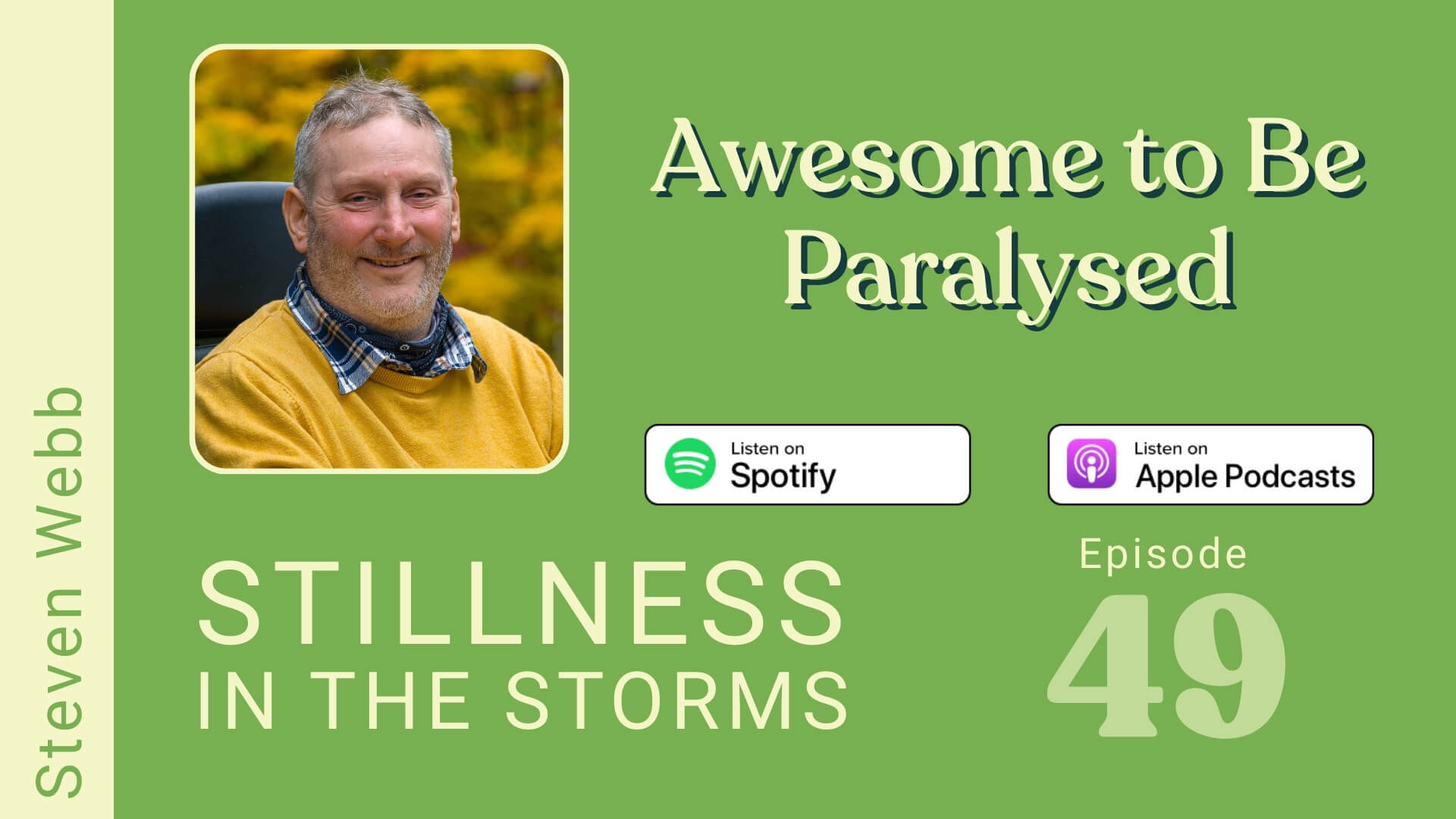
Yes, you read the title right! You can also watch this on my YouTube https://stevenwebb.com/youtube if you prefer to see my wonderful face.
Although this episode may offend some, and I’ve been really vulnerable in some respect. It has a real serious note and that if we reframe things instead of looking at them in a negative way, we can really find the gift in anything.
How You Choose Your Altitude
Links to Steven Webb’s podcast and how you can support his work.
- Donate paypal.me/stevenwebb or Coffee stevenwebb.uk
- Steven’s courses, podcasts and links: stevenwebb.uk
We’re diving into a fresh start as we chat about not settling for the life you currently have. It’s all about making small moves toward the life you want, no matter where you are right now. I share my own journey, dealing with paralysis and how I could’ve easily just accepted less. We talk about how progress doesn’t have to be a giant leap; even tiny steps can lead to big changes over time. So, let’s kick off this new year by focusing on those little things we can do every day to move closer to our goals.
The podcast kicks off with a warm welcome and a heartfelt Happy New Year. We dive into the significance of leaving 2020 behind, a year many of us are eager to forget. Reflecting on personal experiences, I share my journey of overcoming challenges and emphasize that our actions in 2021 will shape our future. The core message revolves around not settling for the status quo, but rather striving for a life that aligns with our true desires. I draw parallels between personal struggles and broader themes of growth and progress, encouraging listeners to embrace small steps towards their goals instead of waiting for drastic life changes.
Throughout the episode, I share anecdotes from my life, particularly focusing on my experiences with paralysis. I discuss the importance of setting realistic expectations for ourselves and the pressure we often feel from society. I stress that it’s okay to not meet every expectation placed upon us; instead, we should focus on our own aspirations and the actions we can take each day. Simple daily improvements, no matter how small, can lead to significant progress over time. This perspective is vital in overcoming feelings of stagnation and frustration in our lives.
As the conversation progresses, I highlight how achieving peace and making progress are interconnected. I discuss how feeling productive, whether through mundane tasks or creative pursuits, enhances our overall well-being. By the end of the episode, I hope listeners feel motivated to reflect on their own lives and consider what small changes they can implement to move closer to their dreams. The episode wraps up with a sneak peek into the next podcast, promising more insights and reflections on life’s challenges and joys.
Takeaways:
- We should not settle for the current life we have; we can always aim higher and improve.
- It’s important to take small steps every day towards our goals, rather than expecting huge changes overnight.
- Reflecting on our lives can help us understand what we truly want to achieve moving forward.
- Progress and peace are essential for a fulfilling life; we need both to feel happy and content.
- Don’t let others’ expectations hold you back; focus on what you want and take action towards it.
- Achieving our dreams often requires patience and persistence; little actions lead to big results over time.
How You Choose Your Altitude
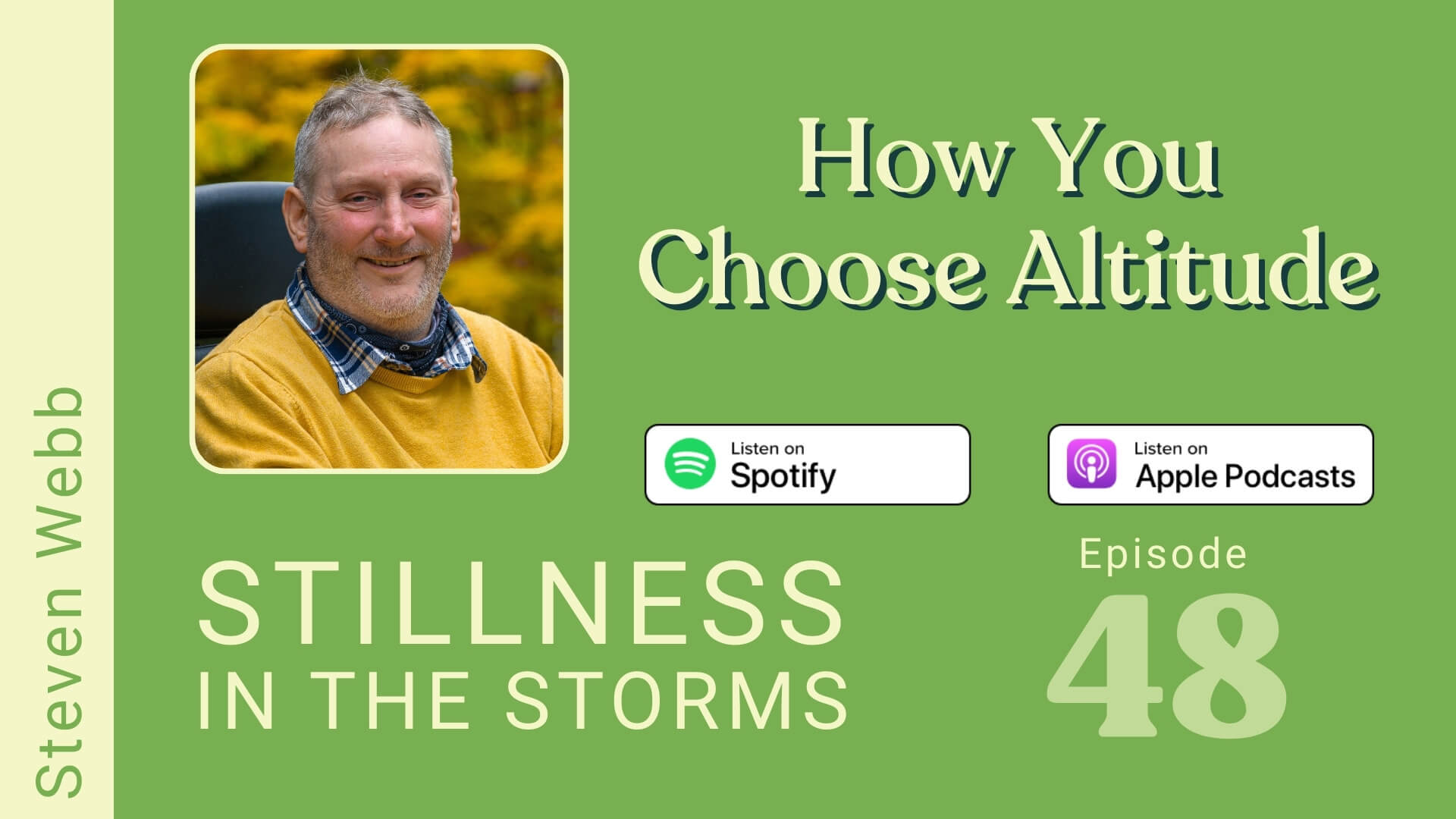
You really do choose how far you go in life. Yes you might be held back a little by the headwinds of your situation, but that doesn’t mean you cannot go anywhere or improve your life at all. In this podcast I share how I could have easily settled, and through little changes every day I am much happier and going in the right direction.
3 WAYS steps to DEAL with STRESS quickly
Links to Steven Webb’s podcast and how you can support his work.
- Donate paypal.me/stevenwebb or Coffee stevenwebb.uk
- Steven’s courses, podcasts and links: stevenwebb.uk
We’re diving into some real talk about stress today. I’m sharing my three steps to reduce stress almost instantly. Stress isn’t the bad guy; it can actually help us in tough situations. The trick is to manage it instead of trying to eliminate it completely. I’ll break down how to soften the stress, listen to it, and understand it better. Stick around for the end where I share these steps that can really help you out.
Stillness in the Storms dives deep into the world of stress management in a really relatable way. Steven Webb, our host, shares his personal experiences with stress, making it clear that it’s a common struggle we all face. He emphasizes that stress isn’t our enemy; rather, it’s a response that has evolved to protect us. Stress can be beneficial in short bursts, like when faced with dangerous situations, but it becomes harmful when it lingers. Stephen explains that the key to managing stress is not to eliminate it completely, but to understand it and reduce its impact on our lives. He introduces three simple steps to help us handle stress better: first, we need to shut up—stop talking and let ourselves breathe; second, be still—calm our minds and bodies; and third, be open—acknowledge our stress and accept it as part of our experience. These steps encourage listeners to embrace stress as a natural part of life and learn how to control it rather than let it control us. With practical advice and a personal touch, this episode is a must-listen for anyone looking to navigate their own stress more effectively.
Takeaways:
- Stress is not our enemy; it’s a natural response that can protect us.
- We can’t get rid of stress completely, but we can learn to manage it.
- The key to reducing stress lies in being quiet, still, and open to our feelings.
- Prolonged stress is harmful, so we should be mindful of how long we remain stressed.
- Understanding that stress can inform us about our needs can help us cope better.
- Being curious about our stress can help us engage with it in a healthier way.
3 WAYS steps to DEAL with STRESS quickly
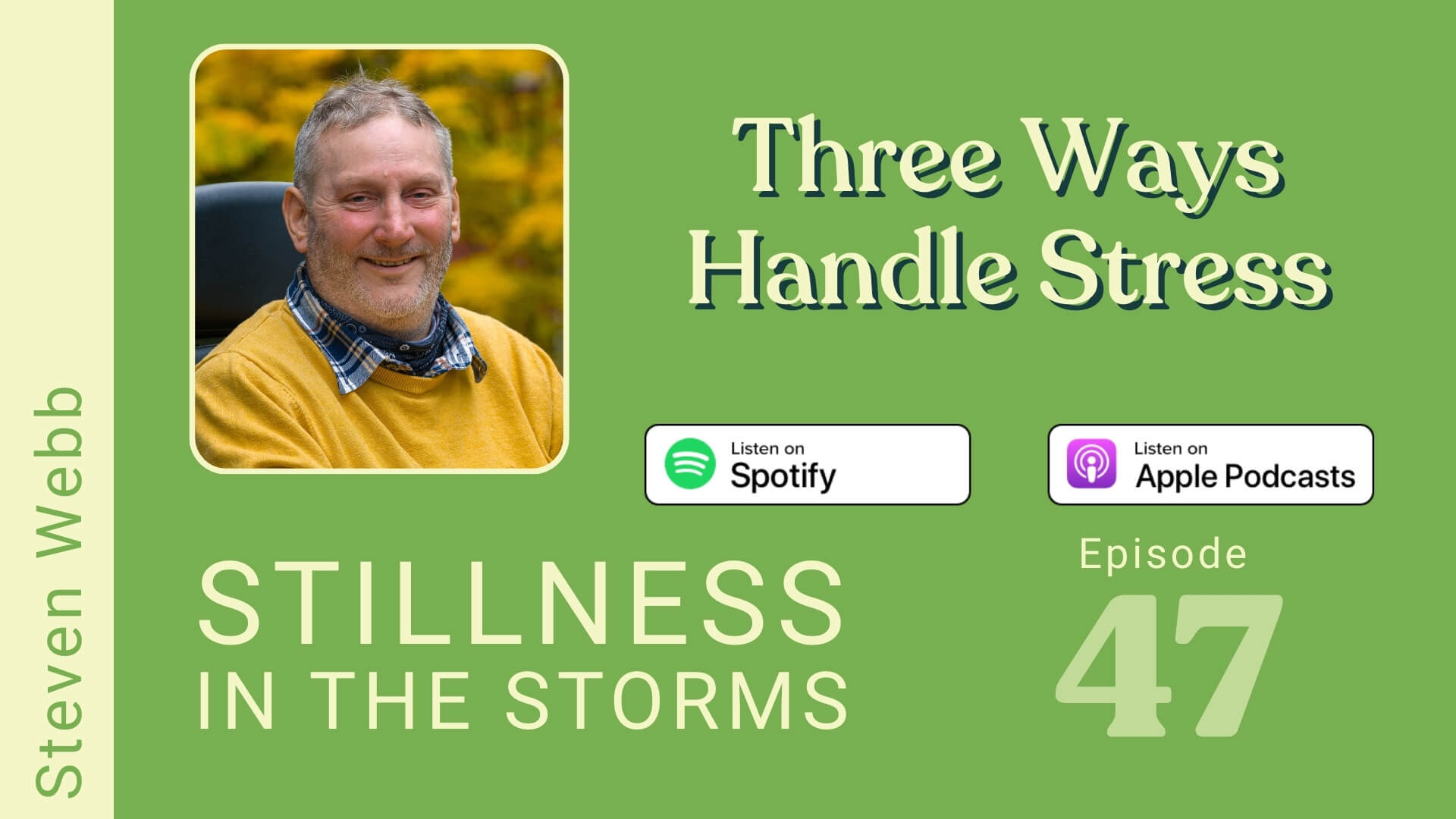
Imagine whenever you’re feeling stressed, having a simple three-step process that reduces your stress to a level that you can deal with it easily and quickly.
Why Your Spiritual Journey is Incomplete
Links to Steven Webb’s podcast and how you can support his work.
- Donate paypal.me/stevenwebb or Coffee stevenwebb.uk
- Steven’s courses, podcasts and links: stevenwebb.uk
The spiritual journey is all about moving from the head to the heart, but it’s not as simple as just shutting off your thoughts. I used to think that to find peace, I had to escape my mind, but now I see it’s about including both thoughts and feelings in the mix. We want to feel deeper, connect with our bodies, and accept all parts of ourselves—thoughts, feelings, and all. This journey is about balance, not eliminating one for the other. So, join me as I dive into why embracing the whole experience makes us more complete and at peace.
Why do we still suffer after we have taken the spiritual journey to our hearts, starting living from this wonderful new place of love and compassion? Yet, we still suffer?
The spiritual journey often feels like a trek from the chaotic networks of our minds into the calm of our hearts. I started this journey wanting to escape pain and suffering, and honestly, that remains my core motivation. However, diving deeper, I’ve realized that merely seeking happiness or external connections might not lead us to true understanding or less suffering. It’s more complex than that. The real journey isn’t just about leaving our minds behind; it’s about embracing both the mind and the heart. I share my insights on how to integrate thoughts without letting them overwhelm us, and how to feel emotions without being swept away. It’s about finding balance and acceptance within ourselves. When we can coexist with our thoughts and feelings, we start to feel more at peace, more whole. This journey is ongoing, and it’s essential to recognize that wherever we are in this process, it’s exactly where we need to be.
Takeaways:
- The spiritual journey is not just about escaping suffering, but feeling deeper emotions.
- It’s important to include both the heart and the mind in our spiritual practice.
- Finding balance between thoughts and feelings creates a more peaceful state of being.
- The journey from head to heart is ongoing and requires acceptance of all emotions.
Why Your Spiritual Journey is Incomplete
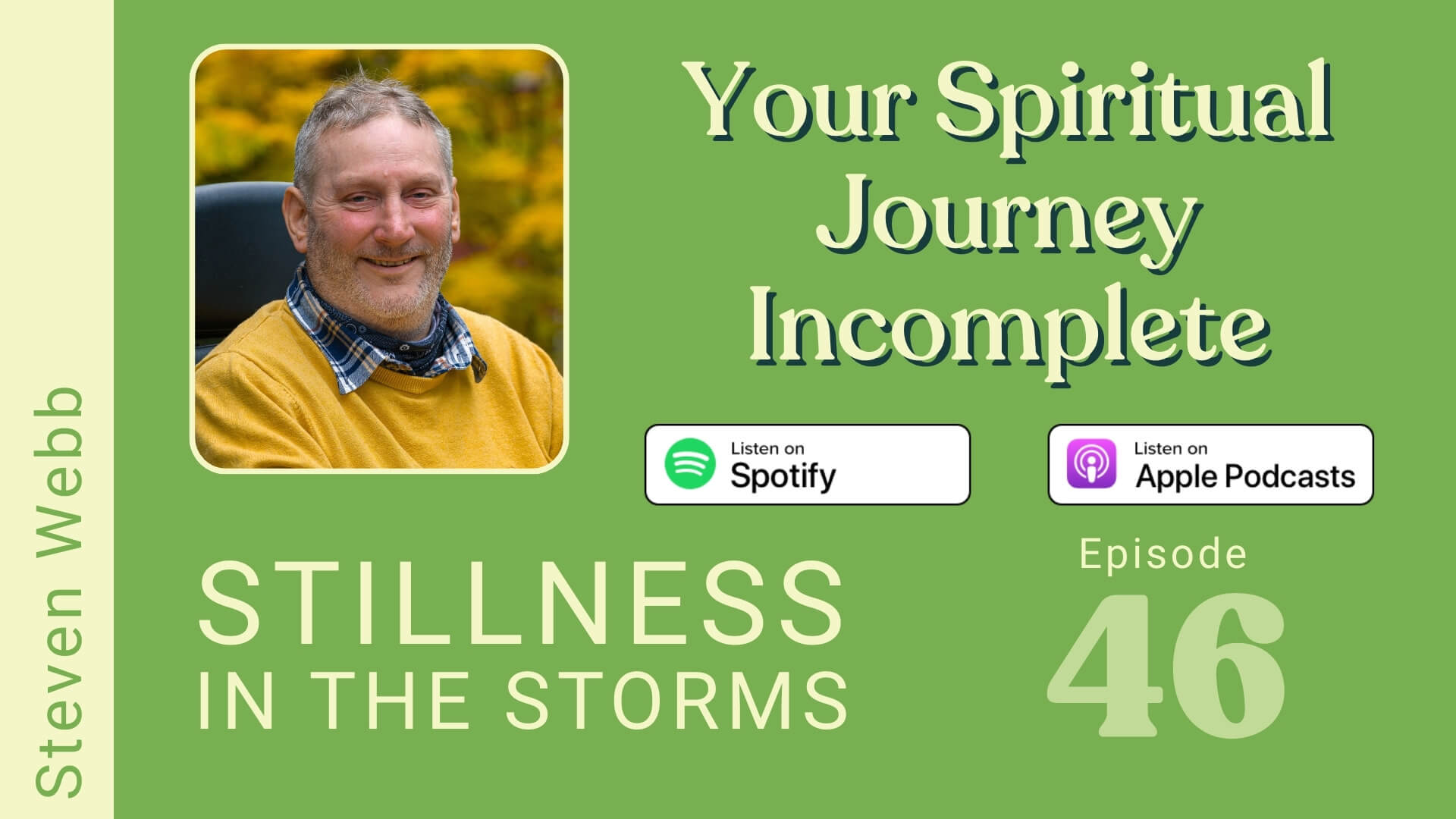
Why do we still suffer after we have taken the spiritual journey to our hearts, starting living from this wonderful new place of love and compassion? Yet, we still suffer?
What to Do When LETTING IT GO Is Too Difficult
We dive into the idea of accepting things instead of trying to let them go. I talk about how we often hear advice to just “move on” or “forgive and forget,” but honestly, that doesn’t work for everyone. It’s all about recognizing that acceptance is the first step before any letting go can happen. I share some personal stories about my own struggles with acceptance, especially after hitting rock bottom. So, let’s explore how accepting our reality can actually lead to less suffering and more inner peace.
Links to Steven Webb’s podcast and how you can support his work.
- Donate paypal.me/stevenwebb or Coffee stevenwebb.uk
- Steven’s courses, podcasts and links: stevenwebb.uk
Accepting things as they are is the theme of today’s show. We often hear the advice to let things go, but what does that really mean? Trying to let things go feels like pushing something away, and honestly, that’s not easy. Reflecting on my own life, I remember when I hit rock bottom at 40. I faced a painful breakup and the struggle of trying to move on. It was tough because I didn’t know how to let go. Instead, I learned that before we can truly let go, we must first accept what has happened. This acceptance is crucial because it leads us to a deeper understanding of our feelings without the added pressure of forcing them away. The show dives into the idea that suffering often comes from our resistance to accepting reality. When we refuse to face what is happening, we create more pain for ourselves. Acceptance is the first step toward peace, and only then can we start to explore letting things be as they are.
Takeaways:
- Accepting things as they are helps reduce suffering and increases inner peace.
- Letting go is an action that often feels forced and doesn’t truly work for many.
- Understanding what we can and cannot change is key to finding peace in life.
- Suffering often comes from resisting reality, so acceptance is crucial for emotional well-being.
- Meditation and mindfulness can help manage strong feelings and promote acceptance.
- Using the Serenity Prayer can provide clarity on what we can change and what we must accept.
